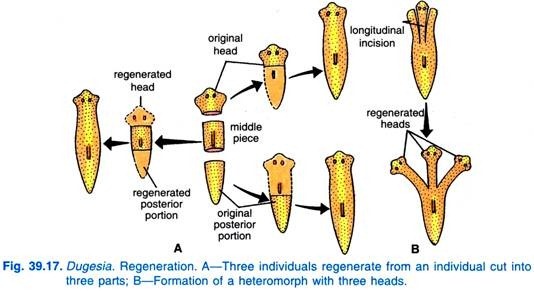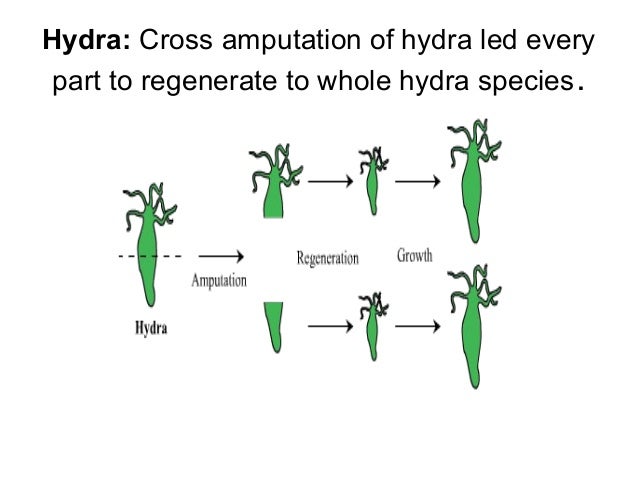Search This Blog
Friday 31 July 2020
class 9th revision of tissue chapter and notebook display
All must come prepared with plant tissues for revision and notebook display for assessment
Monday 27 July 2020
fragmentation ,regeneration ,spore formation class X (asexual reproduction)

In fragmentation ----simple multicellular organisms upon maturity form more individuals from the broken segments eg Spirogyra .This is a very simple primitive method where multicellualar organism is very undifferentiated .
Regenaration ----A fully diffentiated organism has the capacity to give rise to a new individuals from their body parts .This type of reproduction is done by specialized cells eg in this case the simple organisms like Hydra and Planaria ,orgaanism can form many new organisms from their cut body parts


Q What is the difference between regeneration and fragmentation?
A 1 Regeneration occurs in multicellualar organisms with complex body design whereas fragmenation occurs in multicellular organisms with simple body design.
2 In regenation if organism breaks into pieces the brken parts may or may not form full organism but in fragmentation the organism if breaks into parts ,all the broken parts will form new organisms .
3 In regenation specialied cells proliferate and form mass of cells and from those mass of cells the new cells and tissues are diffentiated are formed ,whereas in fragmentation no specialized cells are
involved eg fragmentation in Spirogyre and regeneration in Planaria
Spore formation ---In some multicellualar organisms like Rhizopus or bread mould reproductive structures called sporangia grow on thread like structures which develop on bread or any other food .These sporangia look like blobs on a stick .these sporangia bear spores which grow into new Rhizopus when they get dispersed. The spores are covered with thick coat to protect them from unfavourable conditions until they come in contact with moist conditions .
Q Why are spores covered with thick coat?
A the spores may have to face un favourable conditions ,therefore they protect themselves with coat to tide over the unfavourable conditions and once the favourable conditions of moisture resume they dissolve the coat .
Vegetative propagation---
It is a method in which vegetative parts of parts like stem ,root ,leaf are in involved in reproduction and giv rise to new individual .
vegetative propagation through stem----eg potato ,ginger,onion banana sugarcane
root ----mint ,carrot, raddish , sweet potato, beet root Dahlia, turnip
Leaf---Bryophyllum

Q what are the advantages of vegetative propagation?
A 1 Very useful and desired type of varieties can be multiplied by this method
2 Plants like banana ,sugarcane which donot reproduce through seeds can be multiplied by this mthod
3 very easy ,fast and economical method of reproduction
4 4 The plants like mango yield fruits much faster by this method rather than seeds .
Asexual reproduction class 10th
Budding In this method a bud like projection appears in the body of individual which grows and may get separated to form a new individual like in Hydra or may form chains of buds like in yeast .



Thursday 23 July 2020
Reproduction Assignment class x
Q1 Why is variation important for species and not for an individual?
A Variation is a slow process which enables organisms to adapt themselves according to the changing environment .The process of climate change is very slow and so is the variation ,thus over a long period of time the species will be able to survive the changing environment but as far as individual is concerned ,he will not be able to realize any benefit of variation in his life span.
Q2 What is difference between binary and multiple fission?

Binary Fission :
(i) Nucleus divides into two parts.
(ii) It occurs during normal conditions.
(iii) It gives rise to two individuals.
(iv) Cytoplasm divides after each nuclear division.
e.g., Amoeba.
Multiple Fission :
(i) Nucleus divides into many parts.
(ii) It takes place during unfavourable conditions (Encysted stage),
(iii) It forms many individuals.
(iv) Cytoplasm does not divide after every nuciear division.
e.g., Plasmodium
Q What is the advantage of multiple fisssion to Plasmodium?
A Plasmodium being parasite needs to divide fast so that it can invade the host cells powerfully ,this process of multiple fission enables it to do so and survive otherwise host will kill it easily.
A Variation is a slow process which enables organisms to adapt themselves according to the changing environment .The process of climate change is very slow and so is the variation ,thus over a long period of time the species will be able to survive the changing environment but as far as individual is concerned ,he will not be able to realize any benefit of variation in his life span.
Q2 What is difference between binary and multiple fission?
Binary Fission :
(i) Nucleus divides into two parts.
(ii) It occurs during normal conditions.
(iii) It gives rise to two individuals.
(iv) Cytoplasm divides after each nuclear division.
e.g., Amoeba.
Multiple Fission :
(i) Nucleus divides into many parts.
(ii) It takes place during unfavourable conditions (Encysted stage),
(iii) It forms many individuals.
(iv) Cytoplasm does not divide after every nuciear division.
e.g., Plasmodium
Q What is the advantage of multiple fisssion to Plasmodium?
A Plasmodium being parasite needs to divide fast so that it can invade the host cells powerfully ,this process of multiple fission enables it to do so and survive otherwise host will kill it easily.
Subscribe to:
Posts (Atom)